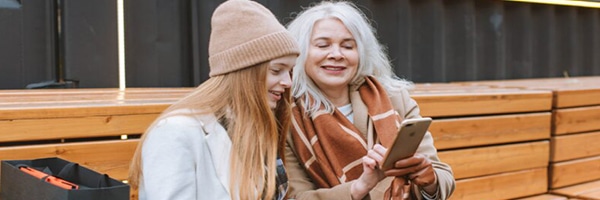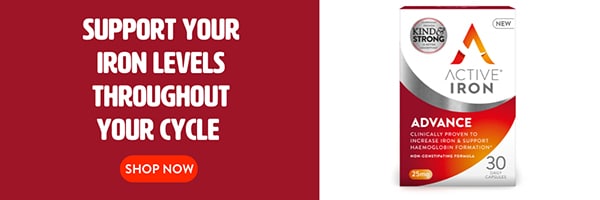Periods! They’re normal, they’re ordinary, and they’re a part of every woman’s life—yet society has habitually stigmatized the subject of menstruation, and discouraged the general public from discussing it openly. As we progress as a society into the 21st century and beyond, it’s important to open up the discussion about periods as an ordinary topic in our daily lives.
Most women remember their first introduction to menstruation, whether by their mother, sisters, or close friends. Periods can be an awkward subject to broach and explain, and that’s why we asked a panel of 169 parents (with the help of My Kids Time) for their advice on talking to teens and tweens about their first period. Here are their top tips:
Talk about it as early as possible
One of the best ways to lift taboos is to have our children talking and thinking about a subject as early as possible. By introducing the idea of periods at a younger age, the teen or tween matures with the terminology already a part of their regular repertoire. Normalizing talking about periods will make it feel like a less daunting task when the teen’s own menstrual cycle starts, as they will have had plenty of time to ask questions, learn, and prepare for the big moment.

Ask them what they already know
When it comes to bringing up new subjects with our teen or tween, there’s nothing we dread more than the teenage eye roll. “Duh, mum, I already know.” Avoid this by asking what they already know in advance, so you don’t waste your or their time and risk incurring an argument. This also allows them to bring up what they might already have questions about so that you can better steer the conversation to their best benefit.
Be honest and open
Being honest and open tells your teen or tween that you respect them enough to discuss sensitive topics in an adult manner, and this, in turn, makes it easier to build trust and confidence. When we use euphemisms and obtuse language, we build the narrative that the topic is somehow gauche, and this encourages the teen or tween to shrink away from open dialogue. It is also important that we support the teen or tweens in growing and exploring the world of adulthood, which can only be done through honest and open dialogue. There are lots of aspects of menstruation that can be scary to a young girl, such as different colours and consistencies of the blood they’re experiencing, cramping, bloating, and even inconsistencies in the regularity of their cycle. Discuss where period blood comes from, how long your period lasts, and how you know your period is coming. By giving our teens and tweens the facts around their period, we also give them peace of mind.
Share your own experience
Teens and tweens are naturally going to have a lot of questions and concerns about going bravely into this new world, and there is nothing better than first-hand experience to calm those nerves. Be open with your children, and tell them about your own experiences—good and bad. Tell some funny stories about a time when you had to ask a stranger for a tampon, or when someone asked you for one. Have you ever been in a pub loo and heard a voice call out, “Any ladies in here who can help a girl out??” Above all, reiterate how you deal with your period on a monthly basis, and how they will, too.

Normalise talking about periods
Introducing the topic early in tween- and teen-hood, we can help our children feel more comfortable about periods by normalising their discourse. The more we hear about something, the more we feel at ease discussing it, and periods are no exception. It can be a good idea to have a series of short conversations, rather than one big, scary talk, which can feel overwhelming. Let them see that you are calm and relaxed when talking about menstruation, to lessen the feeling of something unwieldy and frightful.
Share your advice on how to cope with period symptoms
Like any new life experience, it takes some practice to get a hang of your period. Be sure to equip your teen or tween with loads of tips for coping with period symptoms. If you’re stuck, here are a few which parents have shared with us:
- Use a hot water bottle to alleviate cramping
- Keep pain relievers such as Paracetamol on hand
- Consider taking iron supplements to help support energy and tackle tiredness
- Take a warm shower or bath to alleviate cramping
- Get plenty of rest
- Remember to drink lots of fluids
- Discuss methods for containing menstruation, such as tampons, pads, period underwear, and menstrual cups
- Wear loose or stretchy clothes to feel more comfortable if you experience bloating
Bring brothers, husbands, and fathers into the discourse
At the end of the day, periods are simple biology, and there is no reason why any members of the family should be excluded from the discussion. Serious and life-threatening complications can arise when half the population is kept in the dark about female biology, and by ensuring that a consistent education is provided to all involved, we raise a more educated, compassionate, and level-headed future generation. Getting dad involved is also important, as there might come a day when mum is unavailable to buy a pack of tampons or pick up a suffering daughter from school.

Inform them about irregular periods and pain
Most women can track their periods more or less consistently to a calendar month, but many women have irregular periods, and it is important to let your child know that this can also be normal. Pain and heavy bleeding can both be common side effects associated with periods, but can also be symptoms of more serious issues. By educating yourself and your teen or tween on period-related medical conditions that women experience, such as endometriosis, you give your child the tools to keep herself informed on what she should be feeling, and when it is worth taking a trip to the GP. Some women also experience inadequate iron levels during their period, which can lead to tiredness and fatigue. In this case, routine iron supplementation with Active Iron could help support iron and energy levels throughout their cycle.
There is nothing to be ashamed of
More than anything, it is important to remind your teen or tween that having a period is not shameful. Unfortunately, your child will most likely experience some sort of taunts or teasing from their peers at some point throughout their lives in relation to having their period, and it is vital to stress from the beginning that this is not the right response. Give your child the tools to stand up for herself, support them through difficult times, and let them know that they are worthy of respect. Periods are not dirty, periods are not something that needs to be hidden and never spoken about.

Videos and reading materials
Period-specific videos or reading material can be a great way to access information. While it’s wonderful to have an open dialogue with your teen or tween, some people might find it a daunting task and wish to have some kind of supplemental material to help guide the conversation. Look for informative videos on YouTube, or ask your local librarian to recommend books or magazines.
Have a stash ready
Finally, having easy access to the necessary materials on hand, like tampons, menstrual cups, pads, painkillers, a hot water bottle, and iron supplements, will keep your teen or tween from having any sort of anxiety over their period starting. Many families choose to have a designated period backpack or bag which they can take with them on car rides or trips, in case their child gets their period when they are out of the house. Make sure you also have all supplies easily accessible in the bathroom, and regularly stocked up.
Talking to your teen or tween about their period need not be a scary or unpleasant affair. At the end of the day, teen menstruation is a normal step into womanhood, and a natural fact of life. As your child continues to grow and develop, it is important to embrace this entrance into adulthood, and realise all the joys which it brings. Tell us how you talk to or plan on talking to, your teen or tween about their periods, and reach out to us via:



